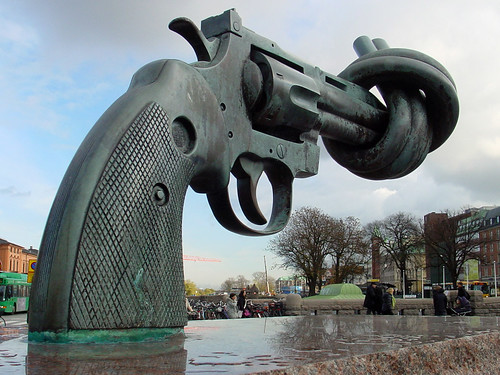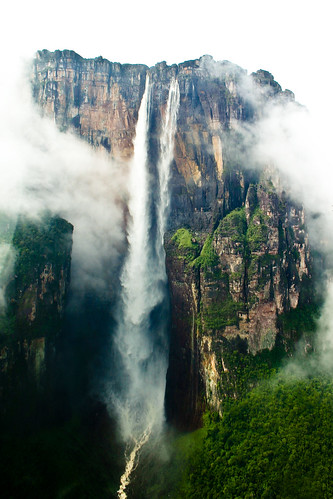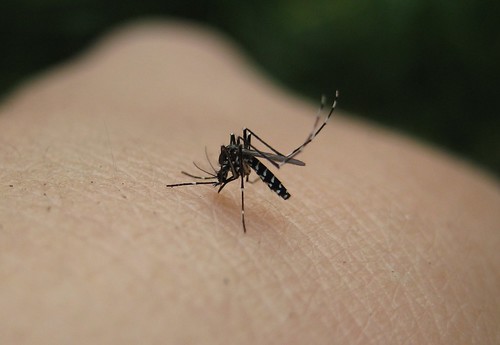Annie Leonard is an expert in international trade and sustainable development, who is more known for her documentary The Story of Stuff (The Story of Stuff), where she talks about the life cycle of goods and services in a very didactic and fun way. However, I just stumbled upon this other documentary of hers, called The Story of Bottled Water, where she basically explains the cycle of bottled water and the unnecesary pollution and waste of money and resources that the industry of bottled water means. I really think you should see both.
The Story of Bottled Water with Annie Leonard from kompozit on Vimeo.
Tuesday, June 22, 2010
Friday, April 30, 2010
"¿Dónde quieres que te dispare?": La violencia interpersonal es un asunto de salud
 Este artículo es una versión en español del artículo "Where do you want me to shoot you?" publicado originalmente en Th!nk About It.
Este artículo es una versión en español del artículo "Where do you want me to shoot you?" publicado originalmente en Th!nk About It.- Francisco manejaba desde el trabajo esa noche, a las 7:00, y estaba esperando que la luz del semáforo cambiara a rojo, cuando un hombre lo apuntó con un arma desde afuera del carro. Francisco se bajó del vehículo y le entregó las llaves, y el hombre tomó el carro y se fue. Diez segundos después, regresó, en reversa, y le dijo: "Casi te vas liso. ¿Dónde quieres que te dispare?"
Francisco escogió la mano, y así fue.
Labels:
Derechos Humanos,
Español,
Salud,
Venezuela,
Violencia
“Where do you want me to shoot you?” : Interpersonal violence is a matter of health
This article was originally written for Th!nk about it: Developing world.
- Francisco was driving from work that night, at 7:00 p.m., and he was waiting for the red light to turn green, when a man pointed at him with a weapon from outside the window. Francisco got off the car and handed him the keys, and the man took the car and leaved. Ten seconds later, he came back, in reverse, and he told Francisco: "You almost left with nothing. Where do you want me to shoot you?".
- Francisco was driving from work that night, at 7:00 p.m., and he was waiting for the red light to turn green, when a man pointed at him with a weapon from outside the window. Francisco got off the car and handed him the keys, and the man took the car and leaved. Ten seconds later, he came back, in reverse, and he told Francisco: "You almost left with nothing. Where do you want me to shoot you?".
Wednesday, April 28, 2010
Habilitadas suscripciones vía e-mail.
He habilitado la suscripción a este blog vía e-mail, para el caso de que algún visitante no utilice lector de feeds y esté interesado en recibir los nuevos artículos en su correo.
Continuamos con la programación habitual. :)
Continuamos con la programación habitual. :)
Labels:
Español
Un par de cosas que no sabía acerca de la Malaria
Este artículo es una versión en español de A few things I didn't know about Malaria, escrito originalmente en inglés para Th!nk About It: Developing World.
Pues bien, estaba investigando en internet para mi viaje la próxima semana a la Cumbre de Global Voices en Chile, y de pronto me encontré leyendo la guía de Planeta Solitario acerca de mi país. Fue un poco un golpe leer la lista de todas las enfermedades de las que previenen a los viajeros cuando visitan Venezuela. Alfabéticamente, en inglés, listan las siguientes: Brucelosis, Cólera, Dengue, Hepatitis A y B, HIV/Sida, Leishmaniasis, Sarampión, Rabia, course), Leishmaniasis, Measles, Rabies, Esquisostomiasis, fiebre transmitida por las garrapatas, fiebre tifoidea, encefalitis equina y fiebre amarilla.
A few things I didn't know about Malaria
(This article was originally written for Th!nk About It: Developing World).
So, I was researching around the web for my trip next week to the Global Voices Summit in Chile, and suddenly I found myself reading the guide on Lonely Planet about my country. I was a bit of a stroke to see all the listed diseases they prevent travelers from while visiting Venezuela. Alphabetically, they list the following: Brucellosis, Cholera, Dengue (breakbone fever), Hepatitis a, Hepatitis b, Hiv/aids (of course), Leishmaniasis, Measles, Rabies, Schistosomiasis, Tick-borne relapsing fever, Typhoid fever, equine encephalitis, and Yellow fever.
So, I was researching around the web for my trip next week to the Global Voices Summit in Chile, and suddenly I found myself reading the guide on Lonely Planet about my country. I was a bit of a stroke to see all the listed diseases they prevent travelers from while visiting Venezuela. Alphabetically, they list the following: Brucellosis, Cholera, Dengue (breakbone fever), Hepatitis a, Hepatitis b, Hiv/aids (of course), Leishmaniasis, Measles, Rabies, Schistosomiasis, Tick-borne relapsing fever, Typhoid fever, equine encephalitis, and Yellow fever.
Labels:
English,
Environment,
Health,
Indigenous Peoples,
Malaria,
MDG,
Poverty,
Venezuela
Monday, April 26, 2010
Venezuela has achieved environmental sustainability: True or false?
This post was originally written for Th!nk About It: Developing World.
 In Venezuela, we have the cheapest gas prices in the world. We pay $0.12 per gallon, when the same amount of water costs around $2.5 (and I'm talking about controlled dollar, not even real black-market one). We have 5.218.942 automotor vehicles in circulation, from which a 5th is located in Caracas, and we consumme over 827 tonnels of oil a day.
In Venezuela, we have the cheapest gas prices in the world. We pay $0.12 per gallon, when the same amount of water costs around $2.5 (and I'm talking about controlled dollar, not even real black-market one). We have 5.218.942 automotor vehicles in circulation, from which a 5th is located in Caracas, and we consumme over 827 tonnels of oil a day.
Labels:
Environment,
Human Rights,
Indigenous Peoples,
MDG,
Venezuela,
Water
Subscribe to:
Posts (Atom)
